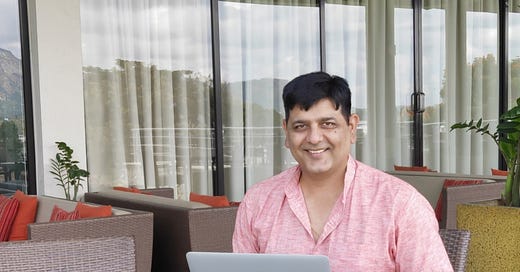🍀ART OF MASTERING DISCOMFORT - Issue 202
Hi, I am JOE and I write on "Mindful Productivity & Cerebral Happiness". My endeavour is to share life lessons, some thoughts, quotes & links to articles/podcasts/books, I discover during the week.
Hey Friends, if you’ve not subscribed till now and want to become a patron of this newsletter then you can do right away before diving into this week’s ‘SUNDAY REATZO’. This way you can support my work and get a ‘Productivity Planner’ worth $25 ( ₹2,000 ) absolutely free & I get an encouragement to keep on writing every Sunday.
In this week's Newsletter, I intend to address a possible approach of getting more life control about discomfort causing situations and how you can master the art of embracing discomfort for better self development.
All of us have our own zone.of comfort & discomfort. But the moot question is - Do we have our Zone Control? Just think about it and see as to what all situations come into your mind when you think about discomfort? And how do you act on your Discomfort?
Psychologically speaking, discomfort can be caused by a mixture of emotions like - • Uncertainty • Worries • Fear
All of these are the subforms of anxiety which causes undue stressed response in our bodies. However, the extent of the consequences of such stress response depends on our perception.
You must have noticed that making changes are easier for Children. This is primarily possible because children feel less discomfort of taking action, because in their early life stage they are less capable of thinking about the possible scary or embarrassing consequences of their actions. Their few life experiences make them less able to anticipate. Instead they focus more on the present than the future.
Another interesting phenomena is that being an Introverts or Extroverts can also influence the way you handle the discomforting situations. For example -
• Introverts think more likely about the consequences, the reaction, of their actions. Essentially , they are future focused oriented individuals; whereas
• Extroverts think more likely about the action itself and are more focused in the present or are more stoic about their thoughts focusing possible future outcomes. Those extroverts who notice a stress response, but react calmly, are more likely to have learned it intentionally with self-awareness.
Being aware of your own perception can help you to identify your own emotions better. When you ask yourself in response of the question – Why am I scared? What you are doing is that -You are trying to rationalise your emotions and question them to identify their appropriateness. By doing so you end up learning more about yourself. When you learn and understand yourself better, you are more considerate and compassionate with yourself. It will be easier for you to find more reasons to act than not to act on your discomfort, because when you repeatedly make the decision to overcome it, it might become a habit. Your brain adapts. The stress response reduces and it becomes easier to focus on the present. Self-awareness in situations of discomfort might help you to become your own best friend.
A lot of people talk about Kaizen. Kaizen means - change to become better. If you decide to do one thing a day that scares you, better start small.
Small steps of change bring compound success in long-run without being overwhelmed quickly, because your brain gets the time to adapt to your new strategy to turn active cognitive chosen changes into passive automated habits.
Mastery doesn't come overnight. Mastery takes time and often sound boring to stay on track for long enough.
A basic principle is – The more time you spend on something, the more competence you grow in that area. I follow and suggest that documenting the situations, where you overcame your discomfort with gratitude journaling in brief consolidate your initial change into a habit with thought structured writing.
Before habitually or blindly acting on every discomfort, you can ask yourself, does it make me happier overcoming it. This way you can evaluate every change based on your own definition of happiness.
Choose Your Mindset-Cycle Wisely
What works for me and my Zone of control may or may not necessarily have to work for you. We all come in diversity. So invest a bit of your time in knowing your self and remember this -;
✅ Comfort - Inaction - Inexperience - Increases Inability.
✅ Discomfort - Action - Experience* (incl. failures) - Enhances Ability.
Have a great week!
Take good care & enjoy reading this week's dose of ‘Mindful Productivity & Cerebral Happiness’.
Joe
Do Join 1000+ Retazoians! for ‘Mindful Updates & Life Skills’
Do follow the ‘JOE’s Life Skills Lab‘ and get yourself enrolled in my E-Mail Newsletter ( Click Here) “SUNDAY RETAZOS” sent exclusively to my subscribers with weekly updates on Mindful Productivity, life lessons and interesting articles, I discover during the Week. I AM SURE YOU DO NOT LIKE TO MISS OUT ON THIS( Click here to enrol yourself)
🖇️🔗💌👉 Get in touch…—🔜 ⤵️ JOE’s LIFE SKILLS LAB/Joe Sehrawat ( Click Here)




An Important Topic for Mankind.
Discomforts are part & parcel of Life, therefore, can't be avoided, but can be managed. Some points I feel I can add to the Topic are as follows:-
Don't react immediately on Discomfort.
Sit calmly and give a thought- How it is going to affect you and how you can mitigate the same.
Work as per decided mitigation steps which you decided.
If discomfort persists, think again on your planned steps, if they need to be modified or changed.
Continue with your efforts maintaining your cool & calmness.
If the Discomfort still continues, discuss it out with your probable helps.
Work as per their advice and also seek their support in coming out of it.
Happy Retazoing !